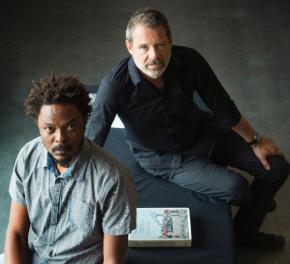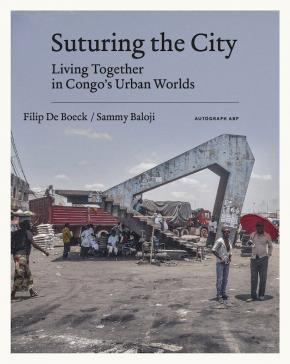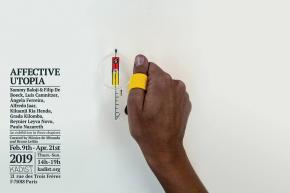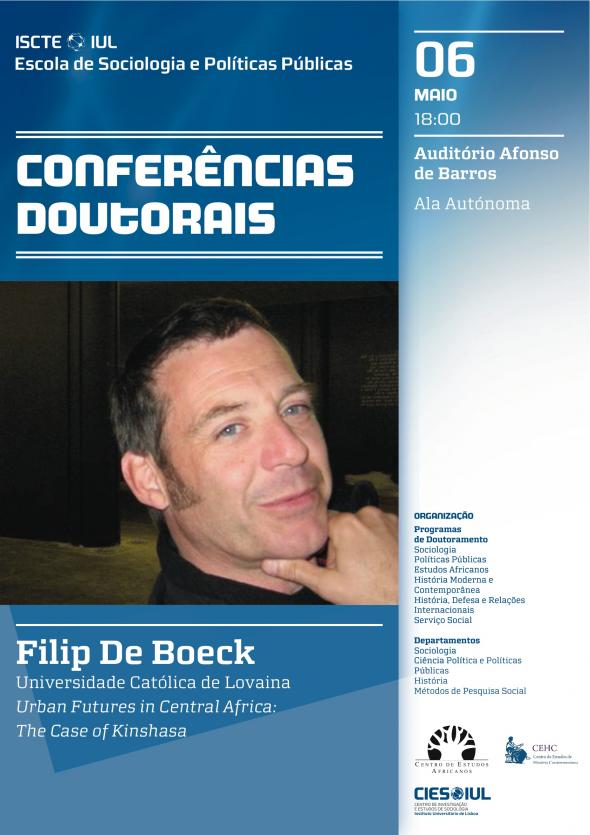 SAMMY BALOJI e FILIP DE BOECK, foto de Dieter TelemansSammy Baloji e Filip De Boeck falarão do seu livro Suturing the City: Living Together in Congo’s Urban Worlds (2016) e da sua exposição Urban Now: City Life in Congo, que estará patente em Lisboa a partir do final de Março (Galeria Av. da Índia).
SAMMY BALOJI e FILIP DE BOECK, foto de Dieter TelemansSammy Baloji e Filip De Boeck falarão do seu livro Suturing the City: Living Together in Congo’s Urban Worlds (2016) e da sua exposição Urban Now: City Life in Congo, que estará patente em Lisboa a partir do final de Março (Galeria Av. da Índia).
Sammy Baloji (b. 1978, Lubumbashi, República Democrática do Congo) é um artista visual que vive entre Bruxelas e Lubumbashi. É o co-fundador da Bienal de Lubumbashi, organizada por Picha Asbl. Reconhecido internacionalmente, o trabalho de Baloji tem sido exibido em espaços relevantes, tais como o Musée du Quai Branly, Paris; Muzee, Ostend; the Royal Museum for Central Africa, Tervuren; Museum for African Art, Nova Iorque; WIELS, Bruxelas; Bienal de Arte de Veneza, Veneza; e Documenta 2017, Kassel e Atenas. Publicações recentes incluem Mémoire/Kolwezi (2014), Hunting and Collecting (2016), e Suturing the City: Living Together in Congo’s Urban Worlds (2016, com Filip De Boeck).
Filip De Boeck (b. 1961, Antuérpia, Bélgica) é Professor de Antropologia no Institute for Anthropological Research in Africa (IARA) da Universidade Católica de Lovaina, Bélgica. As suas publicações incluem Kinshasa: Tales of the Invisible City (2004, com a fotógrafa Marie-Francoise Plissant), e mais recentemente Suturing the City: Living Together in Congo’s Urban Worlds (2016, com Sammy Baloji). De Boeck também realizou Cemetery State (2010), um documentário sobre um cemitério de Kinshasa, e produziu várias exposições. A sua exposição Kinshasa: Imaginary City(2014), co-comissariada com Koen Van Synghel para o pavilhão belga da 9ª Bienal de Arquitectura de Veneza, recebeu um Leão de Ouro.
 Em 2016, De Boeck e Baloji apresentaram a exposição Urban Now: City Life in Congo no WIELS Contemporary Art Centre, Bruxelas, em colaboração com a Open Society (Nova Iorque) e The Power Plant (Toronto). A 23 de Março de 2018, a exposição inaugura na Galeria Avenida da Índia/EGEAC (Lisboa).
Em 2016, De Boeck e Baloji apresentaram a exposição Urban Now: City Life in Congo no WIELS Contemporary Art Centre, Bruxelas, em colaboração com a Open Society (Nova Iorque) e The Power Plant (Toronto). A 23 de Março de 2018, a exposição inaugura na Galeria Avenida da Índia/EGEAC (Lisboa).
Data: 24 de Março de 2018
Local: Hangar – Centro de Investigação Artística
Horário: 18:00 – 20:00
Moderação: Ana Balona de Oliveira
Organização:
Ana Balona de Oliveira, Pensando a Partir do Sul: Comparando Histórias Pós-Coloniais e Identidades Diaspóricas através de Práticas e Espaços Artísticos, Transnational Perspectives on Contemporary Art: Identities and Representation, CASt-IHA-FCSH-NOVA e Visual Culture, Migration, Globalization and Decolonization, CITCOM-CEC-FLUL.
Mónica de Miranda, Post-Archive: Politics of Memory, Place and Identity, CITCOM-CEC-FLUL.
Apoio: DG Artes, FCT – Fundação para a Ciência e a Tecnologia, IHA-FCSH-NOVA, CEC-FLUL.
**
URBAN REALIGNMENTS: ETHNOGRAPHIC AND ARTISTIC VENTURES INTO CONGO’S CITYSCAPES
TALK WITH SAMMY BALOJI AND FILIP DE BOECK
Date: March, 24
Venue: Hangar – Artistic Research Centre, Lisbon
Schedule: 6 pm – 8 pm
Sammy Baloji and Filip De Boeck will discuss their book Suturing the City: Living Together in Congo’s Urban Worlds (2016) and their exhibition Urban Now: City Life in Congo, which will be on view in Lisbon from the end of March (Galeria Av. da Índia).
Sammy Baloji (b. 1978 Lubumbashi, Democratic Republic of Congo) is a visual artist based in Brussels and Lubumbashi. He is the co-founder of the Lubumbashi Biennial organized by Picha Asbl. Internationally renowned, Baloji’s work has been exhibited in prestigious venues such as the Musée du Quai Branly, Paris; Muzee, Ostend; the Royal Museum for Central Africa, Tervuren; Museum for African Art, New York; WIELS, Brussels; the Venice Art Biennial, Venice; and Documenta 2017, Kassel and Athens. Recent book publications include Mémoire/Kolwezi (2014), Hunting and Collecting (2016), and Suturing the City: Living Together in Congo’s Urban Worlds (2016, with Filip De Boeck).
Filip De Boeck (b. 1961, Antwerp, Belgium) is Professor of Anthropology at the Institute for Anthropological Research in Africa (IARA) at the Catholic University of Leuven, Belgium. His book publications include Kinshasa: Tales of the Invisible City (2004, with photographer Marie-Françoise Plissart), and most recently Suturing the City: Living Together in Congo’s Urban Worlds (2016, with Sammy Baloji). De Boeck also directed Cemetery State (2010), a documentary about a Kinshasa graveyard, and produced several exhibitions. His exhibition Kinshasa: Imaginary City (2014), co-curated with Koen Van Synghel for the Belgian Pavillion at the 9th Venice Architecture Biennial, was awarded a Golden Lion.
In 2016, De Boeck and Baloji presented the exhibition Urban Now: City Life in Congo at WIELS Contemporary Art Centre, Brussels, in collaboration with the Open Society (New York) and The Power Plant (Toronto). On March 23 2018, the exhibition will open at Galeria Av. da Índia/EGEAC (Lisbon).
Chair: Ana Balona de Oliveira
Organization:
Ana Balona de Oliveira, Thinking from the South: Comparing Post-Colonial Histories and Diasporic Identities through Artistic Practices and Spaces, Transnational Perspectives on Contemporary Art: Identities and Representation, CASt-IHA-FCSH-NOVA and Visual Culture, Migration, Globalization and Decolonization, CITCOM-CEC-FLUL.
Mónica de Miranda, Post-Archive: Politics of Memory, Place and Identity, CITCOM-CEC-FLUL.
Support: DG Artes, FCT – Foundation for Science and Technology, IHA-FCSH-NOVA, CEC-FLUL
 Avec Sammy Baloji & Filip De Boeck, Luis Camnitzer, Ângela Ferreira, Alfredo Jaar, Kiluanji Kia Henda, Grada Kilomba, Reynier Leyva Novo et Paulo Nazareth*
Avec Sammy Baloji & Filip De Boeck, Luis Camnitzer, Ângela Ferreira, Alfredo Jaar, Kiluanji Kia Henda, Grada Kilomba, Reynier Leyva Novo et Paulo Nazareth*
 Em 2016, De Boeck e Baloji apresentaram a exposição Urban Now: City Life in Congo no WIELS Contemporary Art Centre, Bruxelas, em colaboração com a Open Society (Nova Iorque) e The Power Plant (Toronto). A 23 de Março de 2018, a exposição inaugura na Galeria Avenida da Índia/EGEAC (Lisboa).
Em 2016, De Boeck e Baloji apresentaram a exposição Urban Now: City Life in Congo no WIELS Contemporary Art Centre, Bruxelas, em colaboração com a Open Society (Nova Iorque) e The Power Plant (Toronto). A 23 de Março de 2018, a exposição inaugura na Galeria Avenida da Índia/EGEAC (Lisboa).
